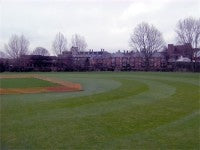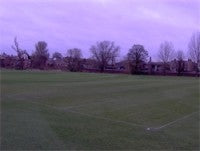Busy month at Shrewsbury County Cricket Ground
Busy month at Shrewsbury County Cricket Ground
By Wayne Lumbard

In the next four weeks I will be preparing the grounds ready for the onslaught of the spring preparation in March.
First let's tackle the topic of mowing. I will mow the squares to 18mm each week in February using the Dennis Cassette Greens mower for a cylinder cut and a Hayter Rotary Box mower. The rotary mower just really cleans up the sward and acts as a great vacuum for debris etc., but make sure the blade is sharp (new blade or sharpened blade). Blunt blades will tear the sward and will give an opening for disease to enter. The weight of the mowers will also help to start to consolidate the square as a very light roll. Change direction of cut each time to cover the whole square in many directions.
On two occasions during February I will sarrel roll the squares to prevent the surface from capping over. It also allows water to pass down the soil profile, helping it to dry and allowing the surface to breathe. We have stopped any deep aeration as we are now trying to consolidate the surface and don't want holes to be visible at the start of the season or encourage unwanted cracks during the summer. From now on we will only sarrel roll.
Next week we shall be applying fertilizer at 35g sq m using Scotts autumn/winter 6:5:10+6% fe with ferrous sulphate. I have used this fertiliser for 7 years and have had great results each time. It has good levels of potassium for this time of year to help harden the sward and resist disease. The iron content/ferrous sulphate also keeps moss at bay and under control.

We swish the squares every day when conditions are right. If worm casts are wet and muddy it will only smear them onto the surface which is something you don't want. Make sure the casts are dry to disperse, or keep off if too wet, otherwise swish to remove dew and keep the sward dry to help reduce disease.
Keep the fence around your square in good order from winds etc. Make sure the fence is doing it's job and looks tidy for presentation. Mow under your temporary fence as and when required to keep on top of the grass.
We only spray with a fungicide if we see the first signs of disease. This winter we have sprayed only once for a mild attack of fusarium. We mainly rely on cultural methods to reduce the incident of disease attack. In our sport we are fortunate to have our main playing areas in the middle of our facility allowing plenty of air movement and no shade problems.
On the outfield we will mow twice in February to around 20-25mm. We use a Dennis 36inch ride on trailed box mower. This collects the clippings and gives a perfect finish when creating your stripes. It also creates a very true surface just with the weight of the mower and trailed seat.
Remember to change direction on each cut, making sure the mower is set correctly and is cutting cleany, and put in your "stripes" or "circles". Presentation is everything even at this time of year. We use the outfields for mini-soccer all winter, so we replace/repair divots after each match, walking over the whole pitch in two directions, goal to goal and touch line to touch line.

Also, at least 1 x spiking of the outfield in the right conditions. Two times would be better, but it comes down to time. We use a compact tractor and a SISIS slitter using 150mm deep slits tines. This operation keeps the outfield free draining, allows gaseous exchange and relieves compaction.
Finally, in the 3rd week of February, we will start rolling the square, but only in the right conditions. Not too wet and not too dry, but in a plasticine state, using a combination of our Dennis Greens mower and our 36 inch Dennis mower with box in as many directions as possible in a chequered pattern. This makes the surface ready for heavier rolling in March.
Keep an eye on the weather. If it becomes too wet, stay off the square, or you will cause damage to the soil profile. Be patient, and the rest of the time cut hedges, prune trees and finish all winter works ready for more preparation work in March.
